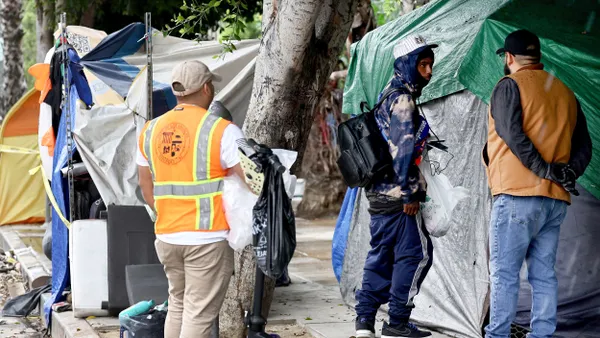Dive Brief:
- As part of a campaign to replace 61,000 streetlights with more energy-efficient LED bulbs, the City of Cleveland, OH will adopt a wireless network to convert its streetlights into a smart network.
- The T-Light Galaxy Network from ST Engineering Telematics Wireless is an end-to-end solution that will allow city officials to set different light intensities for neighborhoods or individual lights in real time, preprogram schedules for special events and get maintenance alerts. Other smart city devices could also run on the network.
- It's estimated that the conversion to LED bulbs will reduce annual operating costs by as much as 50%, and the smart controls could save another 20%, according to Telematics Wireless. The bulbs also last longer than traditional sodium lights, while using less energy.
Dive Insight:
Cleveland Mayor Frank Jackson announced the streetlight overhaul in July as part of the city's Safe Smart CLE program to reduce crime. The $35 million project, as well as the installation of 1,000 high-definition cameras, was touted as a way to clean up and revitalize neighborhoods. "As we know, light and visibility are the enemy of crime and disorder," Police Chief Calvin Williams said at a press conference in July, according to Cleveland Scene.
The wireless network brings a new level of control, allowing the city to take more direct control over lighting in different neighborhoods based on need, and helping the police department target high-crime areas with better light. Three gateways to connect the communications have already been installed, with a fourth on the way as a redundancy. The streetlight conversion is expected to take 18 months, and is being tracked by utility Cleveland Public Power.
Usually under the banner of an energy efficiency agenda, cities like Chicago and San Francisco have been doing the hard work of replacing streetlight bulbs with LED. Those efforts have increasingly taken on more advanced networks, to dim bulbs that are deemed to bright or to keep up on maintenance (Detroit’s LED installations have been marred by faulty bulbs). Cleveland's network, with its public safety backbone, marks another evolution, with the potential to support monitors and cameras.
Still, similar efforts have been the subject of controversy; in San Diego, activists have called for the city to stop gathering data from its smart street lights over privacy concerns, especially with most of the streetlights being installed in minority neighborhoods.











